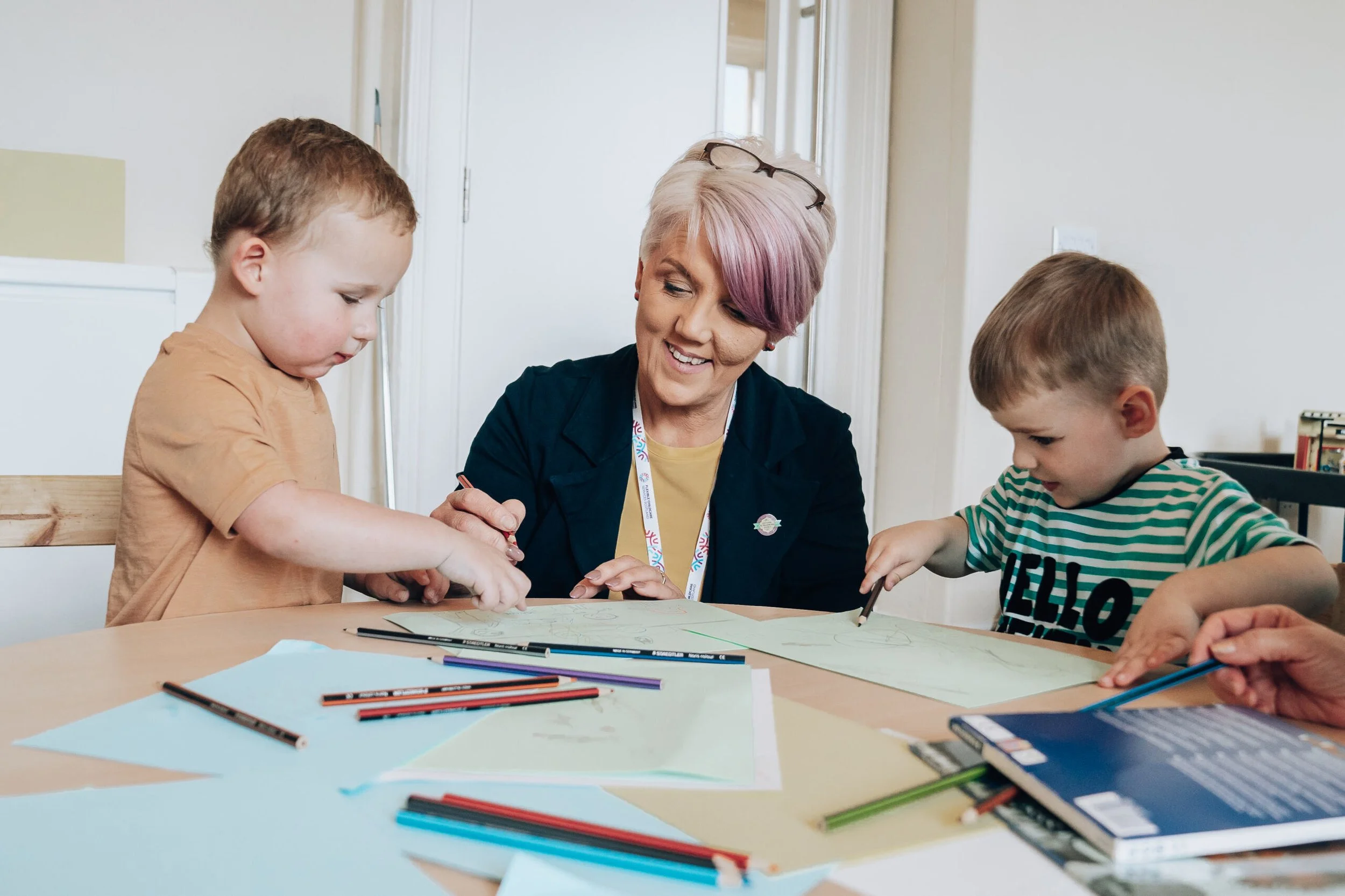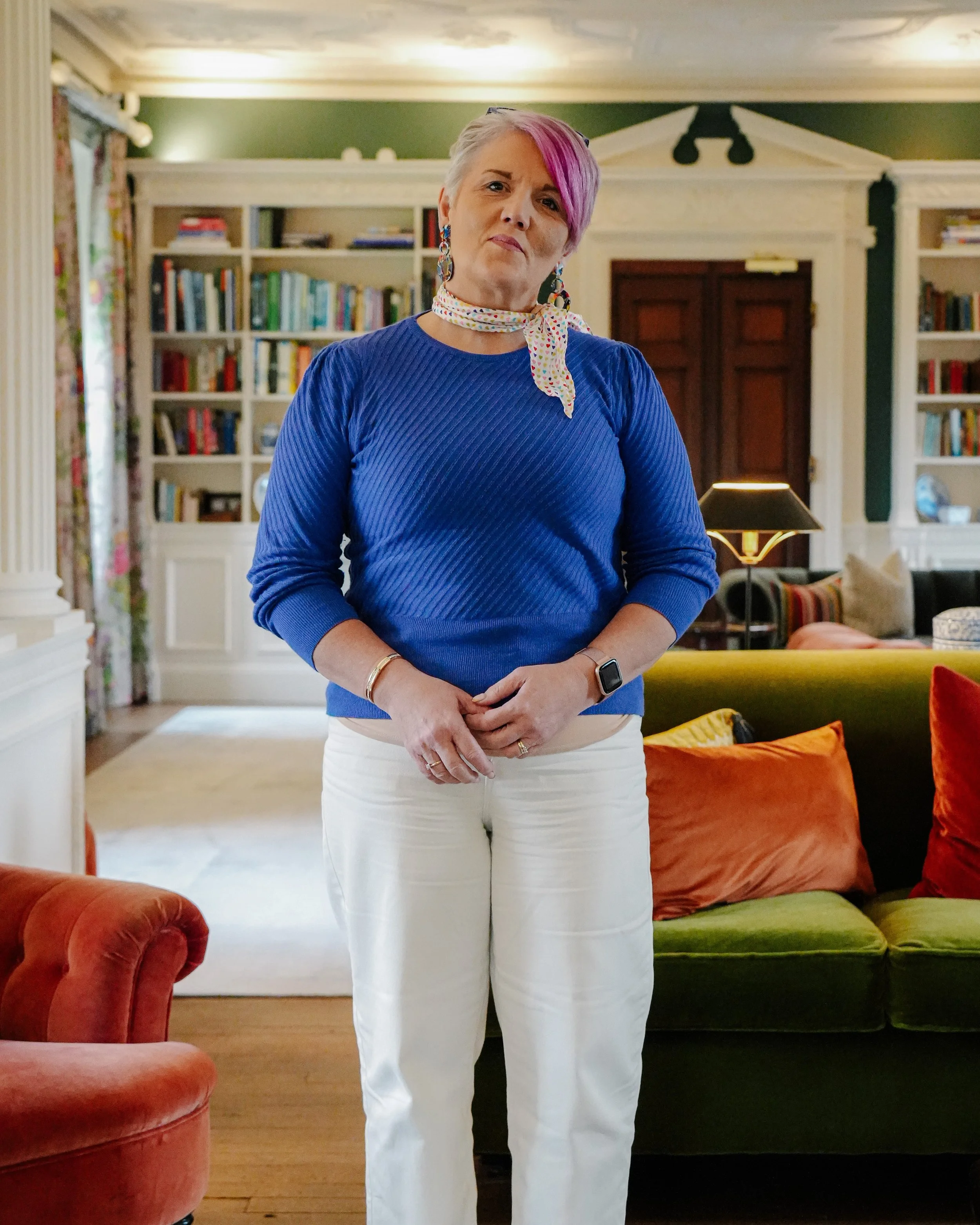susan mcghee is
relentlessly empathetic
Susan McGhee is removing childcare as a barrier to education and employment through empathetic and flexible services. A veteran of the childcare industry, Susan saw firsthand how rigid fees and fixed schedules were denying thousands of parents access to the services they needed to get back into work. Susan’s simple yet effective approach has put £1.9 million into the hands of low income families across Scotland in the last year alone.
Susan spent practically her entire career in the childcare industry. What began as a deep passion to provide the utmost care for children, slowly turned into a disappointment in how broken these services were. This became apparent from her very first role. After completing a National Nursery qualification at college, Susan got herself a job working in local authority’s nurseries but soon found it to be too restrictive. The local authority nursery structure leaves little scope to try different approaches. Sensing lack of opportunity for growth, Susan moved to manage a private nursery, where she had more freedom to innovate and improve how things were done.
Following a career break in which she had her second child, Susan wasn’t able to get back into full time employment due to a lack of toddler childcare in her area. Recognising the gap in provisions, she decided to set up one of her own. She raised the funds and took a space at the premises of her local council nursery. Susan’s toddler group was a hit and the sessions were thriving. Seeing how successful her groups were, the council nursery sought her expertise to help implement extended day offers for families, setting up a lunch provision to ensure children could stay from morning until afternoon. This was Susan’s first step into flexible childcare.
Following the success of her toddler group, Susan had ambitions to manage and grow more services to deliver exceptional childcare, and so she joined a private nursery group as Operations Manager. Susan worked in all areas of the business but over time, her role became more focused on business development, being tasked with growing the group. Susan demonstrated a great aptitude for this, and during this time learnt a great deal about running and scaling a business.
Throughout her time in the role, Susan began to understand more and more that childcare services weren’t accessible to everyone that needed them. “It meets a lot of people's needs, but not everyone's needs and that's what I was noticing more and more.” Susan saw the restrictions it placed on families that didn’t have the financial means or support to make it work. “Nurseries work well for families that have a wee bit of wrap around support, that granny can do pickup sometimes if needed, that can afford the fees. If you don't have that, it's really, really hard.”
Susan knew that she had to utilise her knowledge and experience to fill the gaps in childcare provision that so many families were falling through. Luck would have it, she wasn’t the only one who had come to this conclusion. It just so happened that the very same time she had decided it was time for her to do something different she noticed a job ad. The charity, One Parent Families Scotland (OPFS), had launched a flexibility-focused childcare pilot project in Dundee and were looking for someone to take it forward.
The pilot had been created in response to families living in deprived areas expressing that they couldn’t get back into employment because of a lack of access to childcare. OPFS deemed the pilot a huge success but needed to find an industry expert to grow and expand it further. “Because it wasn’t really their focus, they couldn’t continue to grow and scale it, so they wanted someone to take it over and take it off their hands. It felt really serendipitous.” The timing was perfect and Susan knew it was her calling. She took on the job and registered as a social enterprise. Flexible Childcare Services Scotland (FCSS) was born.
By the scale and success of FCSS today, it’s easy to imagine that these events took place decades ago. The truth is, the first groups only began in 2020. In just four years, Susan has scaled FCSS to 20 settings across Scotland, pioneering flexible services that allow parents on low incomes to get back into work and escape poverty.
A significant percentage of the families supported come from backgrounds in care and healthcare, whose irregular working patterns would have prevented them from accessing traditional childcare services. “Say you’re on a rolling shift, Monday to Wednesday one week, Wednesday to Friday the next week. A regular nursery would make you book the full week. It’s too much for people.”
FCSS, however, allows parents to book the exact hours they require, right down to 15 minute increments. This simple but highly efficient innovation is changing families' lives. “97% of parents say they were better off by between £2,000 and more than £5000 a year. So it’s making a huge difference.” Parents are better off financially, children are better off as they get to spend more quality time with their parents, and ultimately the local economy is better off with more people working and paying taxes.
And the benefits don't end there. Operating in an industry whose models haven’t changed for decades, Susan has come up against many a cynic who believe that flexible services are difficult to staff and even more difficult to profit from. Susan has proven every doubter wrong. Flexible staffing arrangements have actually shown to be extremely beneficial for the industry. Childcare typically attracts a young, female workforce who ironically themselves often have to leave their career behind following motherhood, due to lack of suitable childcare options. Flexible hours enable this workforce to get back into employment and fit their work hours around their life stages. Not only that, when you offer less restrictions, your customer base is likely to grow. A care group who FCSS have supported to implement flexibility in their own services have seen their customer base increase and their income levels soar, simply by allowing booking changes right up until the session start time.
Promoting flexibility is something extremely important to Susan, and led her organisation to creating a digital software tool, Caerus, with the aim of doing just that. Caerus shares learnings, advice and rota planning services with childcare practices across Scotland, as well as connecting parents to providers that match their needs.
This software was utilised by the Government to supply key workers with vital childcare during lockdowns and has evolved today to bridge the gap not just between parents and providers, but also between policy makers. By collecting data that paints a live picture of the requirements of Scotland’s parents, policy makers can better address community needs. Resources and tools are completely free for all registered childcare providers across Scotland. Around 150 providers across Scotland currently benefit from this software, and Susan only has plans to grow that number, utilising the income generation to support the sustainability of the organisation over time.
Susan doesn’t just innovate in the digital realm, she also pioneers new ideas in her organisation’s physical settings. Recognising that many of the families supported by FCSS are also supported by social workers, healthcare visitors and other organisations, she thought what better than to bring them together. With some of her facilities containing a ‘family room or community space’, Susan knew this would offer a more comfortable and safe place for families to access support, rather than in an office. “If we’re working with the same families, why aren’t we doing it together!” In her Aberdeen location, the team have worked with the NHS to place one of their health visitors in house in an innovative test of change model. Not only does this make it easier for families to arrange visits, in observing the children more regularly, the healthcare worker can make faster referrals to get children and families better outcomes, quicker.
The ripple effect of Susan’s empathetic approaches are far reaching in all directions. Everyone involved can benefit from a more flexible and empathetic approach to childcare. Most importantly, Susan is helping some of Scotland’s poorest parents improve their finances, their wellbeing and ultimately lift themselves and their children out of poverty, breaking generational cycles. “In the past year alone, our services have put £1.9 million into the hands of some of Scotland’s poorest parents, some of whom have come from multigenerational unemployment.”
The results are in. FCSS is successfully breaking cycles of poverty with a simple, yet incredibly effective idea. Susan’s motivation to keep moving forward? The wonderful children she sees day in and out. “When I see a wee boy who's worn the same pair of pyjama trousers all week turn up in a new pair of joggers, that’s when I can really see we’re making a difference.”








